The last several years have been incredibly hard on doctors and physicians, as the pandemic has caused an increase in physician burnout, financial stressors for healthcare physicians, and a shortage of doctors and physicians.
Doctors and physicians have certainly had to face many unique challenges over the past several years, and it has taken a toll on them. Despite this, however, we continue to work hard to provide the best possible care for our patients.
When the pandemic first began, doctors and physicians were hit especially hard. Many had to deal with a massive influx of patients, and there was a huge strain placed on medical resources. This, coupled with the uncertainty of the situation and the ever-changing restrictions and regulations, leaves many doctors feeling overwhelmed.
Additionally, there is a nationwide shortage of doctors and physicians. This means that those working have to take on additional responsibilities and longer hours to provide the necessary care.
The world of medicine has long been one of the most important professions in society. Doctors and physicians are often seen as the people who are most responsible for saving lives, treating diseases, and restoring health.
But even beyond that, doctors also serve many other functions in our communities. They serve as advisors, friends, mentors, advocates, and confidantes to their patients.
We are often the first line of defense when it comes to medical emergencies and illnesses. We’re skilled in diagnosing and treating a range of medical issues, from the common cold to serious diseases.
In addition to this, we also have the knowledge and experience needed to educate patients on preventative health measures and provide guidance on lifestyle choices that can improve overall well-being.
Doctors don’t just treat medical conditions; they often serve as compassionate listeners, providing a safe space for patients to open up about issues and worries that may be impacting their physical and mental health. In many cases, these conversations can help to uncover underlying factors that are contributing to a person’s condition, leading to more effective treatment plans.
Doctors are not only a source of care; they also provide comfort. From providing comforting words of encouragement during difficult times to creating moments of joy through shared laughter, doctors often bring hope and light into people’s lives.
In short, doctors play a critical role in our society.
In the face of all the hardships and sacrifices they face, doctors and physicians need to stay motivated and encouraged. I’ve put together a list of my favorite inspirational quotes to help remind doctors and physicians of the importance of their work and to give them some extra motivation and encouragement.
Our Favorite Inspirational Quotes for Doctors & Physicians
Inspirational quotes are powerful because they remind us of the positive aspects of life, the power of human potential, and the importance of perseverance. They can motivate us to keep going despite difficult times, to be our best selves, and to reach our goals.
In a time when we, as doctors and physicians, are facing more stress and hardships than ever before, inspirational quotes can help serve as a reminder that we are doing important work and that our efforts will make a difference in the lives of many people.
Inspirational quotes can also serve as a source of hope and strength, providing encouragement to keep striving for the betterment of our patients and our own careers. By using inspirational quotes to remind ourselves of the value of our work, we can stay motivated, encouraged, and driven in these trying times.

Carl Jung, an early 20th-century psychotherapist and psychiatrist, is credited with creating the field of analytical psychology. He traveled worldwide teaching his theories and is also credited with inspiring Alcoholics Anonymous.
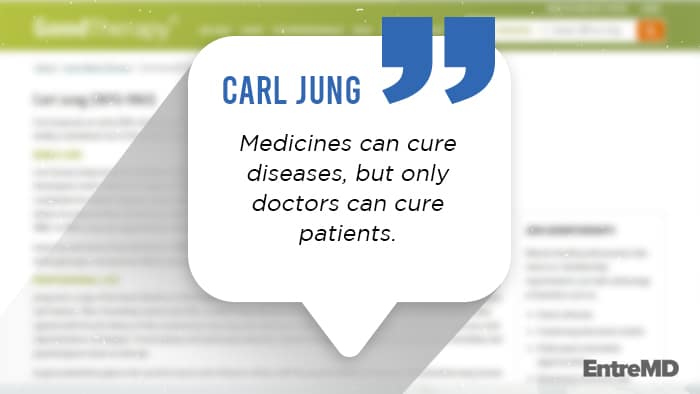
“Medicines can cure diseases, but only doctors can cure patients.”
Bill H. Warren is an American psychologist currently working as the Chancellor’s Professor at Brown University. His work focuses on “perception and action, visual control of locomotion, and spatial navigation.”
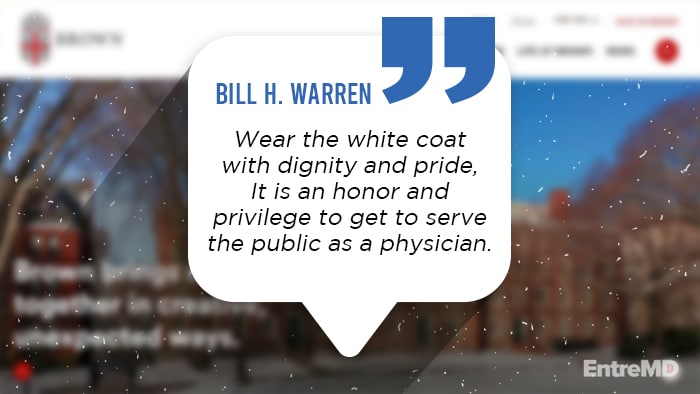
“Wear the white coat with dignity and pride, It is an honor and privilege to get to serve the public as a physician.”
During the Roman Imperial Period, Seneca was a major philosophical figure who made a “lasting contribution to Stoicism.” His essay On Mercy is still considered the first and one of the finest examples of the “mirror of the prince” literature.

“People pay the doctor for his trouble; for his kindness, they still remain in his debt.”
Considered one of the greatest physicians of all time, Sir William Osler, FRS, FRCP, was known as the “Father of Modern Medicine.” After receiving his medical degree in 1872, he taught at McGill University and insisted that students learn both in classroom and clinical settings.
This new approach was revolutionary in a time when medical students would go through their entire training and never touch a patient. Osler is quoted as saying:
“To study medicine without books is to sail an uncharted sea, while to study medicine only from books is not to go to sea at all.”
The poet Walt Whitman was his patient and observed:
“As for Osler: he is a great man — one of the rare men. I should be much surprised if he didn’t soar way, way up — get very famous at his trade — someday. He has the air of the thing about him — of achievement.”
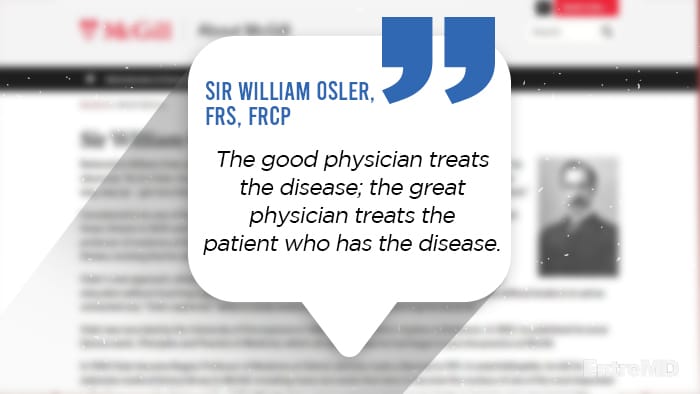
“The good physician treats the disease; the great physician treats the patient who has the disease.”
“The practice of medicine is an art, not a trade; a calling, not a business; a calling in which your heart will be exercised equally with your head. Often the best part of your work will have nothing to do with potions and powders, but with the exercise of an influence of the strong upon the weak, of the righteous upon the wicked, of the wise upon the foolish.”
“Live neither in the past nor in the future, but let each day’s work absorb your entire energies and satisfy your widest ambition.”
Adam Kay, author of This is Going to Hurt: Secret Diaries of a Junior Doctor, is an award-winning comedian, writer, and former junior doctor. His first book was a number-one Sunday Times bestseller for over a year and sold over two million copies.
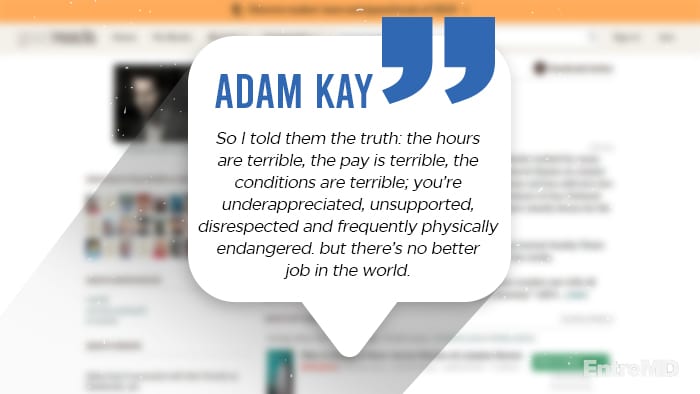
“So I told them the truth: the hours are terrible, the pay is terrible, the conditions are terrible; you’re underappreciated, unsupported, disrespected and frequently physically endangered. but there’s no better job in the world.”
Inspiration for doctors and physicians doesn’t only come from the medical community. Edward Albert, the son of the actor Eddie Albert, was also an actor in his own right.
He went to Oxford University, studied psychology at UCLA, and served on the California Native American Heritage Commission and the California Coastal Commission.
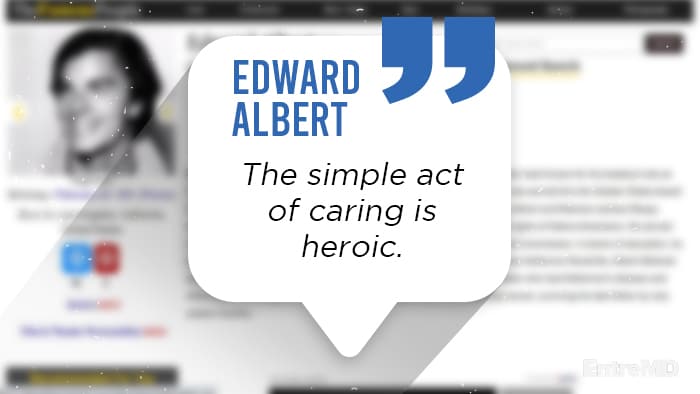
“The simple act of caring is heroic.”
One of the most important English lyrical poets, writers, critics, and philosophers, Samuel Taylor Coleridge, was a co-founder of the Romantic Movement in England, along with William Wordsworth. He was a major influence and created the idea of conversational poetry.
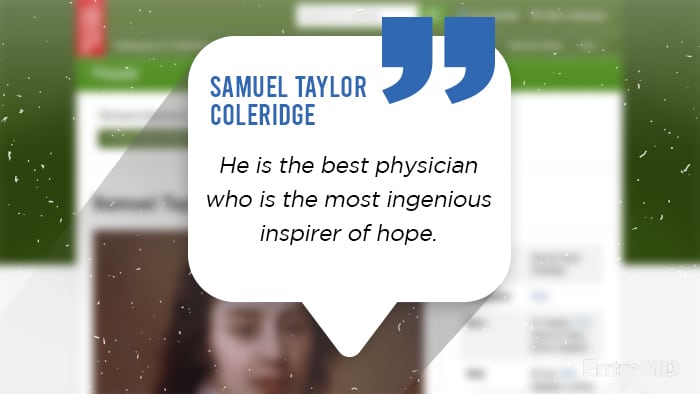
“He is the best physician who is the most ingenious inspirer of hope.”
Not just a famous inventor, Benjamin Franklin helped found the first hospital in what would become the United States of America. He was “directly involved” with crafting and editing political pieces that led to the creation of this new country, including the Declaration of Independence and the Treaty of Paris.
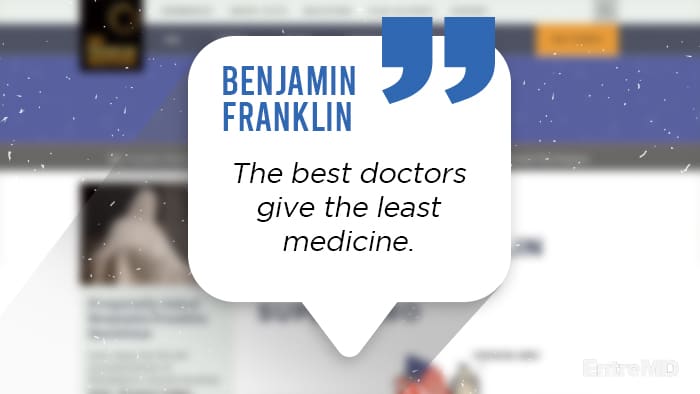
“The best doctors give the least medicine.”
Suneel Dhand is a contemporary medical doctor who is “…on a mission to save a million lives a year by being a Real Public Health and Well-being campaigner.”
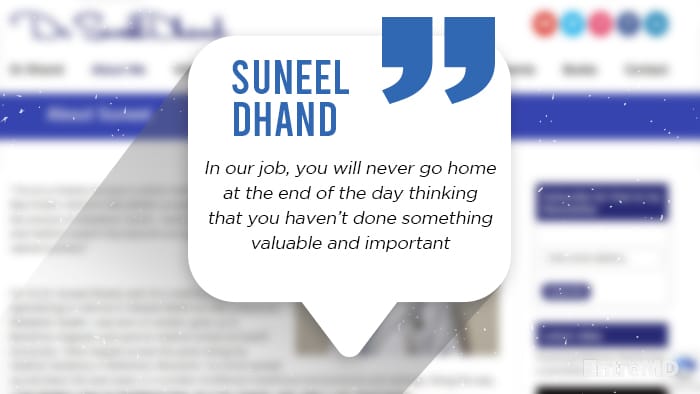
“In our job, you will never go home at the end of the day thinking that you haven’t done something valuable and important.”
Nobel prize winner Dr. Albert Schweitzer was best known for his work as a mission doctor in equatorial Africa, devoting more than 50 years to this work. He was awarded the Nobel Peace Prize in 1952 for his philosophy of “Reverence for Life.”
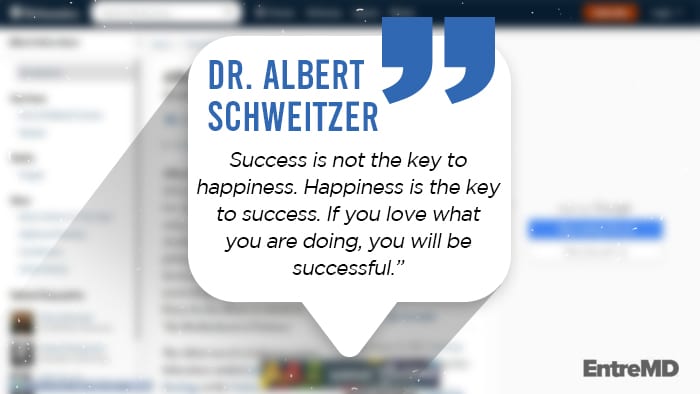
“Success is not the key to happiness. Happiness is the key to success. If you love what you are doing, you will be successful.”
Dr. Wes Fischer, MD, is a board-certified internist, cardiologist, and cardiac electrophysiologist and the co-founder of Practicing Physicians of America. He also writes a popular blog where he “stands up for the practicing physician.”
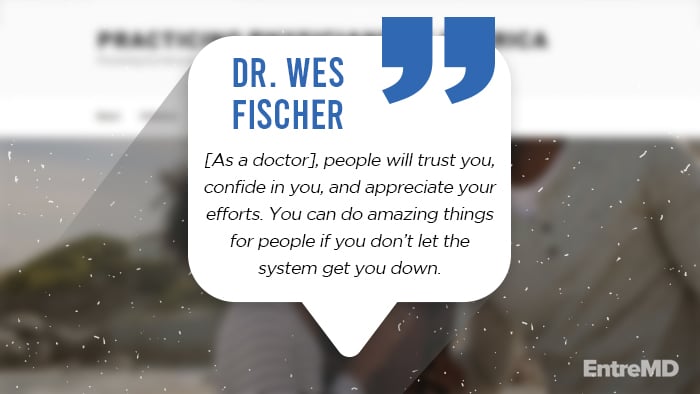
“[As a doctor], people will trust you, confide in you, and appreciate your efforts. You can do amazing things for people if you don’t let the system get you down.”
With over 50 years of medical experience, Dr. William R. Francis is board-certified in orthopedic surgery, with more than 35 years of experience in complex spine surgery, including scoliosis, spinal deformities, trauma, and metabolic bone diseases. He also has extensive experience in reconstructive spine surgery of the neck and lower back.
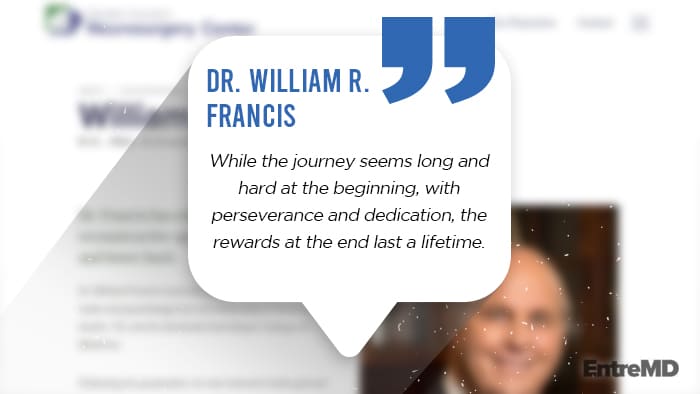
“While the journey seems long and hard at the beginning, with perseverance and dedication, the rewards at the end last a lifetime.”
“I always tell my residents to never forget that we have the opportunity to do more good in one day than most people have in a month.”
“We practice medicine that our historical ancestors could only dream of, and we have access to amazing treatments and cures for our patients on a daily basis.”
Jimmy Johnson played five seasons with the Cowboys and led the team to two Super Bowl championships. He also coached the Miami Dolphins for four seasons and was inducted into the Pro Football Hall of Fame.
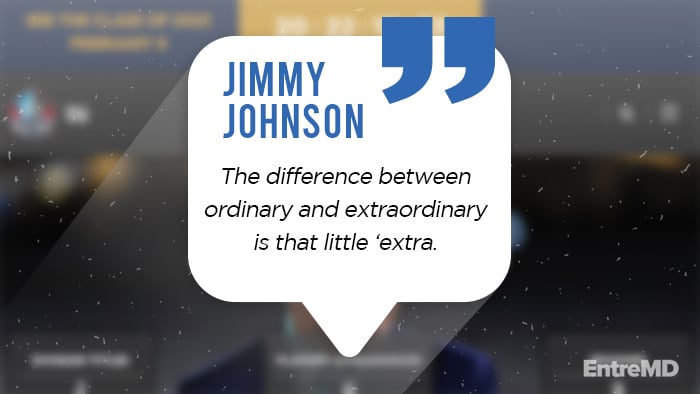
“The difference between ordinary and extraordinary is that little ‘extra.'”
Although he lived about 2,400 years ago, Hippocrates wrote over 70 books on diseases and their treatment and is considered to be the father of modern medicine. He lived in Greece and died at the age of 104 after saving Athens from a plague epidemic.
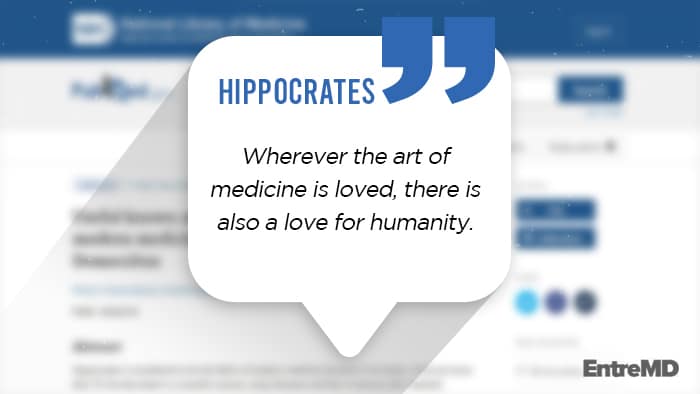
“Wherever the art of medicine is loved, there is also a love for humanity.”
The most famous political dissident in history, Mahatma Gandhi led India’s independence movement over the course of the 1930s and 1940s. Martin Luther King Jr. was deeply influenced by Gandhi’s stance of non-violence and applied this philosophy to civil unrest in the United States.
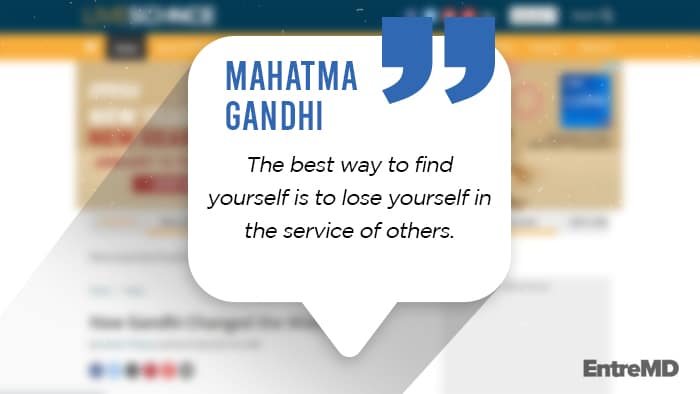
“The best way to find yourself is to lose yourself in the service of others.”
John-Paul H. Dedam, MD, is a family medicine doctor practicing in Albuquerque, NM. He’s affiliated with the Lovelace Medical Center and has this to say about being a doctor:
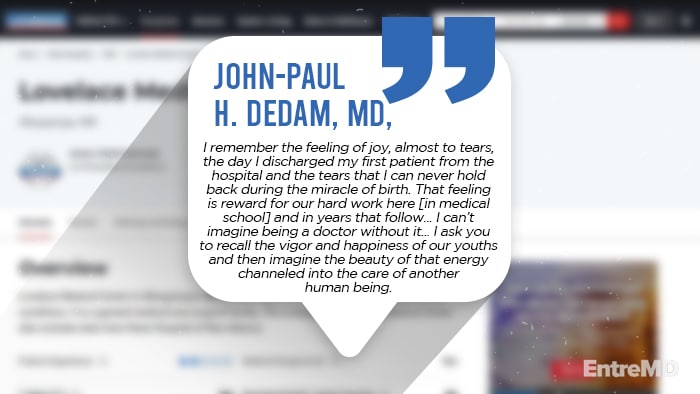
“I remember the feeling of joy, almost to tears, the day I discharged my first patient from the hospital and the tears that I can never hold back during the miracle of birth. That feeling is reward for our hard work here [in medical school] and in years that follow… I can’t imagine being a doctor without it… I ask you to recall the vigor and happiness of our youths and then imagine the beauty of that energy channeled into the care of another human being.”
One of the “most eminent research workers and clinicians in the second half of the 19th century,” Hermann Nothnagel was born in Austria in 1841. He wrote several “valuable publications on neurology and pharmacology” and later “edited a system of special pathology and treatment” in 24 volumes.
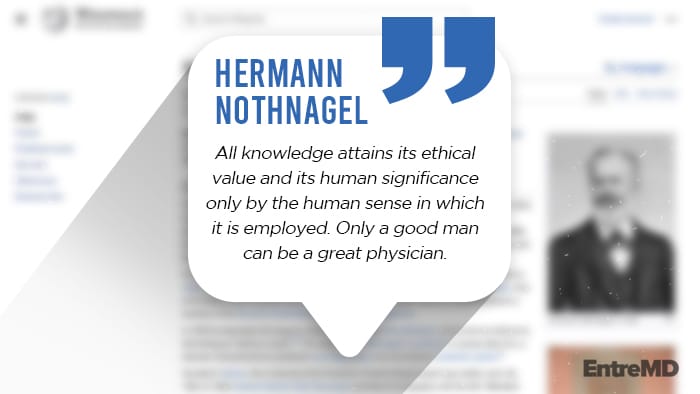
“All knowledge attains its ethical value and its human significance only by the human sense in which it is employed. Only a good man can be a great physician.”
Christian Friedrich Samuel Hahnemann was a German physician credited with creating Homeopathy during his lifetime (1755-1843). He developed a strong reputation as a clinician as well as an acclaimed chemist. He translated medical books from one language to another as a hobby.
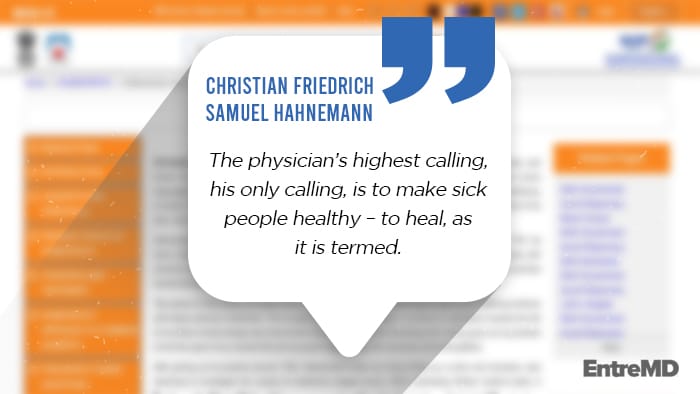
“The physician’s highest calling, his only calling, is to make sick people healthy – to heal, as it is termed.”
The healthcare industry and government have been working diligently over the past few years to provide much-needed aid to doctors and physicians. Recently, the federal government passed legislation to provide $3 billion dollars in debt forgiveness for doctors and nurses in the form of student loan repayment plans.
Additionally, the Centers for Medicare and Medicaid Services (CMS) has proposed a 7.5% increase in payments for primary care services provided by doctors and physician assistants.
To help lessen the burden of pandemic-related costs, the American Rescue Plan allocated $7.6 billion to hospitals and health centers, as well as an additional $2.25 billion to community health centers. These funds can be used to support safety net hospitals, expand access to mental health services, increase access to healthcare personnel, and invest in infrastructure improvements.
As well, in 2021, Congress passed a bill that included an additional $24 billion in funding for providers that took part in the public health emergency. This money can be used to cover any extraordinary costs related to the pandemic, such as providing patient care for individuals with COVID-19, acquiring personal protective equipment (PPE), and any other associated expenses.
Overall, the healthcare industry and government have taken significant steps to support doctors and physicians during these difficult times. Through increased funding and expanded benefits, both parties have worked hard to ensure that healthcare workers have the necessary resources to continue providing quality care.

